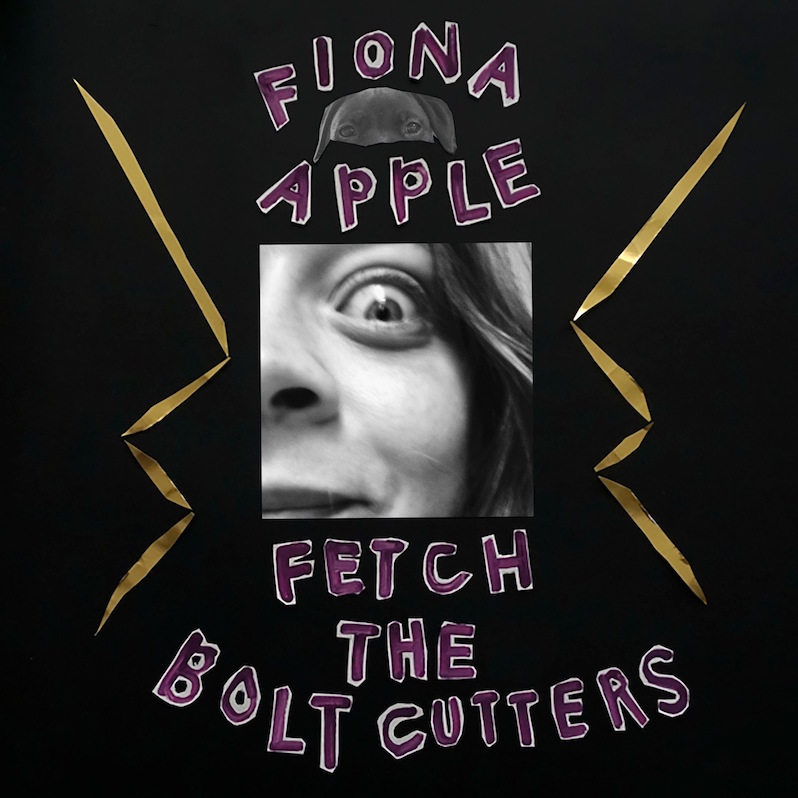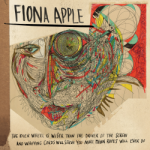Fiona Apple – Fetch the Bolt Cutters

Fiona Apple is tired of our bullshit. She’s been tired of it for a long time. She called us out on it in her infamous MTV Video Music Awards speech in 1997, and was not praised for her candor but met with scorn—called precocious, ridiculous, insufferable, hypocritical, everything but “bitch” by a (predominantly white, predominantly male) media that didn’t know what to make of her. How the 23 years since that speech have proven Apple right.
Those that they call “sullen girls” grow into opinionated, insightful women, acutely aware of the ways that this world is indeed bullshit—how it can beat a person down into numbness or hysteria, how there are forces that actively thrive on preserving its bullshittiness. Apple’s response to this, from her 1996 debut Tidal onward, has been one of sincerity and empathy, but also an unmistakable toughness: “I could swallow the seas to wash down all this pride,” she boasted on “Sleep to Dream”, stunting on the chump who dared drag her heart around. (According to one story, Apple was just 14 when she first conceived of the song; according to another, she wrote it about an ex-boyfriend who first saw the music video while in bed with another woman, and felt so emasculated that he couldn’t finish.) But as the world has become more entrenched in its own bullshit, Apple’s sincerity and empathy have only grown. Her toughness, always an armor to protect herself from the world, has also become a weapon to wield against it.
Fetch the Bolt Cutters, Apple’s long-awaited fifth album, is the most potent distillation of her essence yet, presenting the artist as pissed off and funny and warm—sometimes all three at once. It hits the ground running with “I Want You to Love Me,” which after its angular, percussive introduction morphs into a classic Fiona Apple love song. “I’ve waited many years/Every print I left upon the track, has led me here,” she sings, winking at the eight years that have passed since The Idler Wheel… “And next year, it’ll be clear / This was only leading me to that, and by that time, I hope that / You love me,” she continues, dragging out the you so long that the word starts to quiver. And then she starts flexing in the way that only she can:
“I move with the trees in the breeze
I know that time is elastic
And I know, when I go, all my particles disband and disperse
And I’ll be back in the pulse
And I know none of this will matter in the long run
But I know a sound is still a sound, around no one“
It’s an astonishing reminder of the power that Apple exercises when she opens her mouth—the purity of her expression, how she can wrap the urgency of screaming within the prettiness of singing, and vice versa. She has a rapper’s delivery, not just for the percussive effect that her words have, but for her ability to project bravado, and then to project vulnerability in ways few others would dare. Clichéd as it is to call a voice an instrument, there aren’t many singers who make it sound as deserved, or dignified, as Apple, whose voice remains as gorgeous and emotive as ever.
Speaking of instruments: Most of my critical analysis of Fetch the Bolt Cutters is going to be focused on the album’s lyrical content, so I suppose now is as good a place as any to talk about the music therein. The word “percussive,” more than any other word, has been used to describe the album’s sound, and over the course of the record, Apple and company bang on walls, dog collars, a metal butterfly, a water tower and even the box containing the bones of one of Apple’s beloved dogs. And these unorthodox instruments aren’t just for keeping time—they’re often the focal point of the songs, as much as Apple’s voice. (Her piano playing appears on fewer than half of the tracks, and when it does—as on the polyrhythmic standout “Shameika” and the jazzy sway of “Cosmonauts”—it’s mostly just another percussive element in the mix.) Every sound is shot through with the kind of manic excitement that comes with creating and controlling chaos, much more akin to Tom Waits than former collaborator Jon Brion. But the best and most accurate progenitor for Fetch the Bolt Cutters is Apple’s own discography; the stripped-down and raw feel of 2012’s The Idler Wheel… in retrospect sounds like a dry run for what Apple does on Fetch the Bolt Cutters.
Apple initially described the album’s main theme as “not being afraid to speak”—a motif that ran through her past work as well—later adding, “it’s about breaking out of whatever prison you’ve allowed yourself to live in.” The title track initially reads like a vicious put-down to a critic or an ex-lover until it veers into more personal territory, getting at something Apple wishes she had known when she was younger: “I listened because/I hadn’t found my own voice yet / So all I could hear was the noise that/People make when they don’t know shit/But I didn’t know that yet.” (She was joined on the track by friend Cara Delevingne and about four dogs.) Sometimes, as on the churning “Heavy Balloon,” it’s a prison of our own making that we get trapped in—in this case, depression. She sings most of the song in a lower register, but when she hits the hook, she’s ragged and defiant, like she’s leading a march: “I spread like strawberries/I climb like peas and beans/I’ve been sucking in so long/That I’m busting at the seams.”
For the most part, though, Apple’s bolt cutters are trained on the prisons that other people try to keep us, and especially women, in. She takes aim at love, hanging selfish ex-lovers out to dry on “Rack of His” and weighing the possibilities and pressures of loving one person forever on the standout “Cosmonauts.” And she takes aim at the patriarchy: “Relay” boils the cycle of toxic masculinity down to a pithy chorus (“Evil is a relay sport, when the one who’s burnedturns to pass the torch”), while “Under the Table” hilariously makes a scene at a dinner party full of insufferable men. Politely beg to disagree? To hell with that—Apple’s going to call the bastards out, at length and with great glee, no matter how much you kick her under the table.
And then there’s “For Her,” Fetch the Bolt Cutters’ most overtly #MeToo-inspired moment. It’s a song that was written not long after the Brett Kavanaugh hearings, although it incorporates elements from other stories Apple had been told; it’s also the kind of song that practically warrants a trigger warning. “You raped me in the same bed your daughter was born in,” she howls in what is Fetch the Bolt Cutters’ most scorched-earth moment. Though the lasting effects of trauma is a theme that has surfaced in Apple’s work before, “For Her” is the most unguarded it has ever been in its exploration of trauma itself. (Apple was raped by a stranger at the age of 12, although she has never written a song about her own experience, once claiming “there’s nothing poetic about it.”) Nevertheless, it is a song could only have been written by a woman who has survived something that no person should have to endure.
Crucially, it is for women such as those that Apple sings these songs. One of the more insidious ways that men try to maintain their power over women is to turn them against each other, at both the personal and the patriarchal level. (It’s fortuitous that Fetch the Bolt Cutters arrived days after the premiere of Mrs. America.) The waltzing “Ladies” is a wryly funny but totally earnest invitation to the woman who takes Apple’s place in an ex’s bed: Make yourself comfortable. Help yourself to the things I left behind. That dress in the closet isn’t mine, but maybe it’ll look better on you than it did on me. On the other hand, “Newspaper” is more sinister, Apple watching from a distance as a man does to another woman what he once did to her. “I watch him walk over, talk over you, be mean to you / And it makes me feel close to you,” she sings.
There it is again—Apple’s sincerity and empathy. She can use her words to heal just as easily as she can use them to hurt, seeing you just as easily as she can see through you. The titular girl in “Shameika” once saw Apple like that, back in those formative middle school years; her gruff words of encouragement—“you have potential”—reappear in the song’s chorus. “Back then I didn’t know what potential meant,” Apple sings, “but Shameika wasn’t gentle and she wasn’t my friend/She got through to me and I’ll never see her again.” Later, on “Heavy Balloon,” Apple writes one of the most insightful and affecting lyrics I’ve ever heard about the perverse comfort of chronic sadness and how it corrupts your perspective: “You get dragged down, down to the same spot enough times in a row/The bottom begins to feel like the only safe place that you know.” It’s a line you only have to hear once to remember forever.
Offering one beautifully messy capsule of humanity after another, Fetch the Bolt Cutters reminds us why we wait years for Fiona Apple to return. Once again, she has rewarded our faith with a collection of songs that feel elemental and instinctual and alive, saying to us the very things we want to tell ourselves when we feel anything but strong and smart and graceful, and in words that we only wish we could summon. Records such as these will always feel timeless, but having Fetch the Bolt Cutters now, in a world built for and broken by men, it couldn’t be timelier.
Label: Epic
Year: 2020
Similar Albums: Fiona Apple – The Idler Wheel
Fiona Apple – The Idler Wheel Joanna Newsom – Divers
Joanna Newsom – Divers
St. Vincent – St. Vincent
Fiona Apple : Fetch the Bolt Cutters
Note: When you buy something through our affiliate links, Treble receives a commission. All albums we cover are chosen by our editors and contributors.
Jacob Nierenberg is a man of contrasts: a Pacific Northwesterner who carries an umbrella, a pacifist who enjoys the John Wick movies, an idealist who follows politics. Scarcely a day goes by that he doesn't talk with his best friend (and fellow Treble contributor) Tyler Dunston, the Jim Morrison to his Bernie Sanders.

